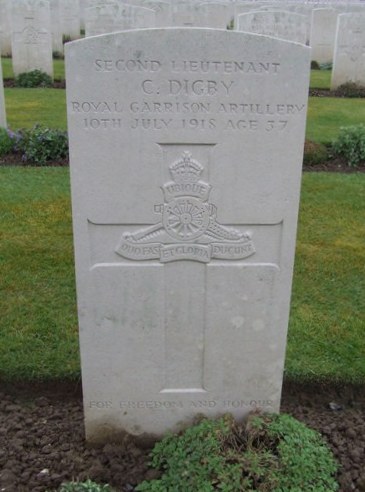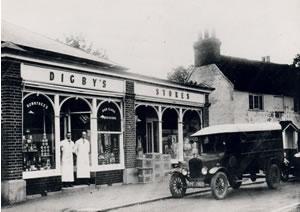Charles Digby
Charles
Digby was born in 1881. He was the son of James and Maria Digby.
In 1901 the
census records the family living at the Sugar Loaves Public House (Now
called Lower Rays Farm) at the end of Mole Hill Green Road
James Digby - 59 - Publican and Baker (died 1907)
Maria - 59 (died 1902)
Frank - 24 - Baker/breadmaker
Minnie - 17 - Shop Assistant
Daisy Hurrell - 12 - Grand-daughter
Charles was already 21 and had moved away and was a Grocer's Assistant in Carshalton.
Charles served as a Second Lieutenant with the 123rd Siege Battery, of
the Royal Garrison Artillery which first went overseas to France on 18th
July 1916.
He died aged 37 on 10th July 1918. He is buried at the Cabaret-Rouge
British Cemetery, Souchez.
(photograph of grave courtesy www.britishwargraves.co.uk)
The Essex Weekly News of 26th July 1918 includes the following item in its Roll of Honour:
Second-Lieut. Charles Digby, a Siege Battery, R.G.A., was killed in action on July 10. He was a son of the late Mr. James Digby, of Rays Farm, Felsted, and a brother of Mr W.F. Digby, of the same place. The deceased, who was about 37 years of age and single, was before joining the Army in business as a grocer at Byfleet, Surrey. The Lieut-Col. commanding the Brigade, in a sympathetic letter to Mr W.F. Digby says: "He was a good subaltern in a good battery, highly thought of by his seniors and popular with all. He and his Major were killed together and their deaths were painless. They were buried the same afternoon side by side. The service was conducted by a Church of England chaplain. Each was taken to his grave by the men of the battery, and covered by the Union Jack and in a blanket - the soldier's coffin. From the grave one can look across the enemy's lines in full view - lines your brother did his full share in harassing. The service was held in heavy rain, and all the time the guns of the Brigade sent shell after shell over our heads, carrying on the work of those we laid to rest." - Several other letters from the deceased's fellow officer and the Chaplain have also been received, expressing the deepest sympathy and speaking in the highest terms of the gallantry and popularity of the fallen officer.
 Charles Digby is not remembered on the War Memorial at Felsted, but does
appear amongst the names on the Byfleet Memorial.
Charles Digby is not remembered on the War Memorial at Felsted, but does
appear amongst the names on the Byfleet Memorial.
Digby's High Class Grocers and Freeland's ironmongers, Byfleet about 1920 (nicknamed the "Tuesday Shop" due to customers always being told "it'll be in on Tuesday")